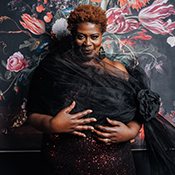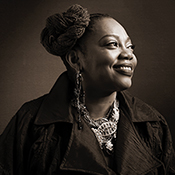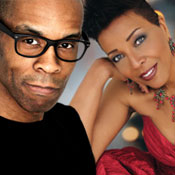
Byron Stripling Leads MSO in Swingin’ Performance
David Lewellen
PUBLISHED
Tagged Under: 2022.23 Season, Conductor, Guest Artist
Jazz conductor and trumpeter Byron Stripling will lead the MSO in an Uptown Nights pops concert this weekend, featuring music associated with Harlem in the big band era. Stripling spoke to Backstage writer David Lewellen recently by phone. Here is an edited version of their conversation.
Q. Tell me a little about your musical background.
A. My dad was a classical singer, teacher, and conductor, and we would listen to Metropolitan Opera broadcasts on the radio. But when he came home from work, he would put on jazz. And late at night, he’d pour himself a drink and listen to the Temptations, the Four Tops, all the Motown classics. So I had a broad influence. I went to Eastman for classical trumpet, but I also wound up touring with jazz and playing pops. I’ve played with Aretha Franklin, Whitney Houston, Tony Bennett. It’s been a varied career.
Q. With all those influences, how did you wind up with jazz as your focus?
A. I don’t like being labeled. I want to keep the fluidity of all the music I love. It’s easy for people to define you, and it makes them more comfortable, but it doesn’t make me comfortable.
Q. How did you get into conducting in the first place?
A. I’d be sitting in an orchestra, and I’d complain to the people next to me, “I can’t believe he’s taking this tempo.” And finally my friends did an intervention and said, “If you want something different, get off your behind and do it yourself.” They didn’t say, “We think you’d be good at this.” They just said, “We’re tired of hearing this.” And that helped me become a better performer, too.
I also learned a lot from watching the conductors in Broadway pit orchestras. They’re not flamboyant. They have to get the job done and be precise, because there’s probably a lot of subs in the orchestra, and you can’t be cute.
Q. How do you split your attention between conducting and playing?
A. Well, first of all, I’m getting old. I played trumpet at the Last Supper. But I need to play the trumpet every day to stay in shape. For a piece I’m conducting and playing at the same time, I have to make sure the arrangement doesn’t have a need for me. You figure out where you can turn around and play and leave the orchestra alone.
Q. In most of your promo photos, you’re holding a B-flat trumpet. Is that your normal jazz instrument?
A. Yes. I’ve been around great flugelhorn players, and when I play it, it sounds like crap. The piccolo trumpet is the hardest. When I was young, I was crazy about Maurice Andre (a noted classical performer on piccolo trumpet). I wanted to be him. Everything he played was infused with love and joy. I heard him play in Paris, and at the end of one piece, he totally screwed up. And you know what he did? He laughed. And he kept going and played the crap out of the rest of the show. We all make mistakes sometimes, but then we let it snowball and get worse. To see him laugh it off was a great lesson.
Q. That’s unusual in the classical setting.
A. The classical setting needs to work on acknowledging the musicians. When I was young and went to hear Count Basie, I knew the name of everyone in the band. If an orchestra musician plays a great solo, they should be recognized by name.
Q. We’re used to that in jazz. Is the conductor going to shout someone’s name after they finish their solo in a Mahler symphony?
A. Not during the piece. But at the end, as audience members, we need to know who that person is and acknowledge them in a different way. We need to build the bridge, and that’s not so healthy in classical music right now.
Q. What are other ways to build connections?
A. When I was a kid, my parents took me to see singers like Pavarotti, Horne – and Leontyne Price. She looked like a queen onstage. Then afterward, my mom said, “We’re going to go backstage and meet her.” And we did, and my mom gave Leontyne Price a hug, and she said, “This concert changed my life, and it will live in me forever.” That’s the power of music.
Q. You’ll be coming back to Milwaukee for the Holiday Pops in December. What do you like to do for that kind of concert?
A. I do the dreidel song. When I moved to New York, one of my musician colleagues was Ian Finkel, the son of the Yiddish actor Fyvush Finkel, and they invited me to their home and I ate all of these Jewish foods that I’d never had before. So that’s a way that I keep their legacy alive. But we’ll also have the gospel tradition with “Go Tell It on the Mountain,” and “Joy to the World.” It doesn’t have to be religious, it’s just joy. It’s all about love, and that’s what I want all of my shows to do through music.



